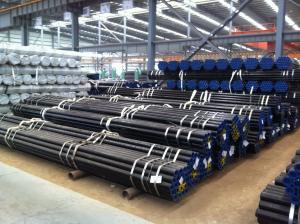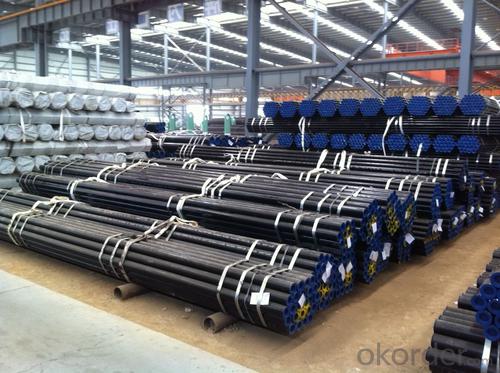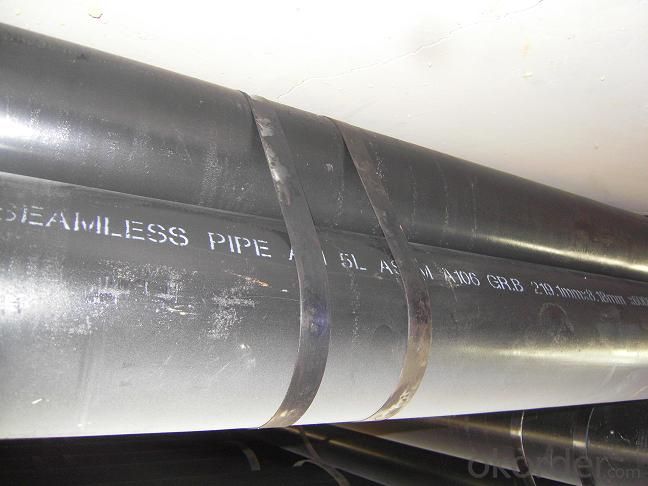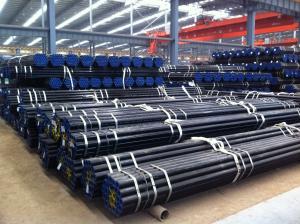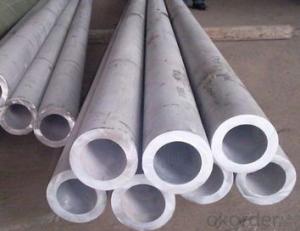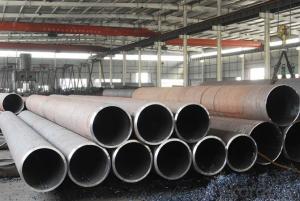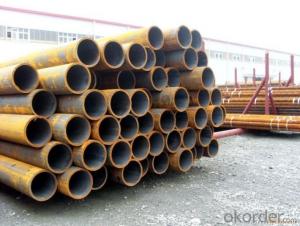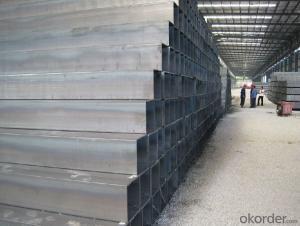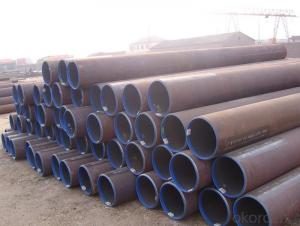API 5L Carbon Seamless Steel Pipe for 5 Inch Hot Sales
- Loading Port:
- Tianjin
- Payment Terms:
- TT OR LC
- Min Order Qty:
- 25 m.t.
- Supply Capability:
- 1000 m.t./month
OKorder Service Pledge
OKorder Financial Service
You Might Also Like
Product Description:
1、Structure of API 5L Carbon Seamless Steel Pipe for 5 Inch Hot Sales:
Seamless pipe is formed by drawing a solid billet over a piercing rod to create the hollow shell. As the manufacturing process does not include any welding, seamless pipes are perceived to be stronger and more reliable. Historically seamless pipe was regarded as withstanding pressure better than other types, and was often more easily available than welded pipe.
2、Main Features of API 5L Carbon Seamless Steel Pipe for 5 Inch Hot Sales Application:
• High manufacturing accuracy
• High strength
• Small inertia resistance
• Strong heat dissipation ability
• Good visual effect
• Reasonable price
3、API 5L Carbon Seamless Steel Pipe for 5 Inch Hot Sales Images:
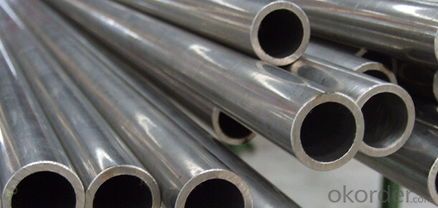
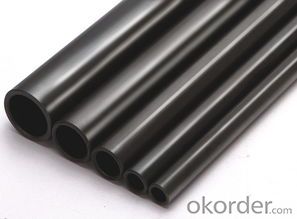
Packaging & Delivery
Packaging Details: | seaworthy package,bundles wrapped with strong steel strip |
Delivery Detail: | 15-30days after received 30%TT |
4、API 5L Carbon Seamless Steel Pipe for 5 Inch Hot Sales Specification:
Standard | GB, DIN, ASTM |
Grade | 10#-45#, 16Mn |
Thickness | 8 - 33 mm |
Section Shape | Round |
Outer Diameter | 133 - 219 mm |
Place of Origin | Shandong, China (Mainland) |
Secondary Or Not | Non-secondary |
Application | Hydraulic Pipe |
Technique | Cold Drawn |
Certification | API |
Surface Treatment | factory state or painted black |
Special Pipe | API Pipe |
Alloy Or Not | Non-alloy |
Length | 5-12M |
Outer Diameter | 21.3-610mm |
Grade | 20#, 45#, Q345, API J55, API K55, API L80, API N80, API P110, A53B |
Standard | ASME, ASTM |
1.Material:20#(ASTM A 106/A53 GRB.API5LGRB,GB),45#,16Mn,10#.
2.Specification range:OD:21.3-610mm,WT:6-70mm,length:6-12m or according to the requirement of clients.
3.Excutive standards:GB,ASME API5L.ASTM A 106/A53,Despite of the above standards,we can also supply seamless steel pipe with standard of DIN,JIS,and so on,and also develop new products according to the requirements of our clients!
4.Surface:black lacquered,varnish coating or galvanized.
5.Ends:Beveled or square cut,plastic capped,painted.
6.Packing:bundles wrapped with strong steel strip,seaworthy packing.
5、FAQ of API 5L Carbon Seamless Steel Pipe for 5 Inch Hot Sales:
①How is the quality of your products?
Our products are manufactured strictly according to national and internaional standard, and we take a test
on every pipe before delivered out. If you want see our quality certifications and all kinds of testing report, please just ask us for it.
Guaranteed: If products’ quality don’t accord to discription as we give or the promise before you place order, we promise 100% refund.
②How about price?
Yes, we are factory and be able to give you lowest price below market one, and we have a policy that “ for saving time and absolutely honest business attitude, we quote as lowest as possible for any customer, and discount can be given according to quantity”,if you like bargain and factory price is not low enough as you think, just don’t waste your time.Please trust the quotation we would give you, it is professional one.
③Why should you chose us?
Chose happens because of quality, then price, We can give you both.Additionally, we can also offer professional products inquiry, products knowledge train(for agents), smooth goods delivery, exellent customer solution proposals.Our service formula: good quality+good price+good service=customer’s trust
SGS test is available, customer inspection before shipping is welcome, third party inspection is no problem.
Any question, pls feel free to contact us !
- Q: Why can't stainless steel be put together with carbon steel tube?
- 1, the potential difference is: potential "stainless steel tube" and the negative potential "carbon steel" coupled "stainless steel", "a cathode carbon steel tube" is anode potentials of the two difference the greater the galvanic corrosion is bigger.2. An electronic passage formed by wire connection or direct contact. The carbon in the carbon steel tube loses its electrons to the stainless steel tube and the surface is absorbed by the etchant.3. Electrolyte: the contact area of two metals is covered or submerged by electrolyte. The iron in the carbon tube loses electrons to form ions into the solution, and the electrons on the surface of the stainless steel tubes are taken away by the corrosive agents in the electrolyte (such as oxygen in the air). Electrolytes become ionic channels.
- Q: How are steel pipes used in natural gas processing plants?
- Steel pipes are used in natural gas processing plants to transport and distribute the gas throughout the facility. They provide a reliable and durable infrastructure for the safe and efficient movement of gas from extraction to processing and distribution.
- Q: How are steel pipes installed underground?
- Steel pipes are installed underground through a process called trenching, where a trench is dug in the ground according to the desired pipe route. The trench is then prepared by removing any hindrances and ensuring a level base. The steel pipes are laid into the trench, with proper alignment and connections between sections. Once in place, the trench is backfilled with soil, compacted, and any necessary restoration work is done on the surface.
- Q: What are the different types of pipe coatings used for corrosion protection?
- There are several different types of pipe coatings used for corrosion protection. These coatings are applied to the exterior surface of pipes to prevent or delay corrosion, ensuring the longevity and integrity of the pipes. Some of the commonly used pipe coatings for corrosion protection include: 1. Fusion-Bonded Epoxy (FBE) Coatings: FBE coatings are widely used for corrosion protection due to their excellent adhesion and resistance to chemicals, moisture, and abrasion. These coatings are applied by heating the pipe and spraying it with epoxy powder, which then melts and forms a protective layer upon cooling. 2. Polyethylene (PE) Coatings: PE coatings are known for their flexibility and resistance to impact and chemicals. These coatings are typically applied by extrusion or wrapping methods and provide excellent resistance against water, soil, and other corrosive substances. 3. Polyurethane (PU) Coatings: PU coatings offer good resistance to chemicals, moisture, and mechanical damage. They are commonly used for underground pipelines and are applied by spraying or brush coating methods. 4. Coal-Tar Enamel Coatings: Coal-tar enamel coatings are suitable for protecting pipes exposed to highly corrosive environments such as marine conditions or underground applications. They are typically applied by hot or cold wrapping methods and provide excellent resistance to water, acids, and alkalis. 5. Metallic Coatings: Metallic coatings such as zinc, aluminum, or zinc-aluminum alloys are often used as sacrificial coatings to protect the underlying steel pipes. These coatings corrode preferentially, sacrificing themselves to protect the pipe from corrosion. 6. Asphalt Coatings: Asphalt coatings provide a robust barrier against moisture, chemicals, and soil. They are typically applied by hot or cold wrapping methods and are commonly used for underground pipelines. It is important to consider factors such as the specific environment, temperature, and expected lifespan of the pipes when selecting the appropriate type of pipe coating for corrosion protection.
- Q: Are steel pipes suitable for underground sewage lines?
- Yes, steel pipes are suitable for underground sewage lines. They are strong, durable, and resistant to corrosion, making them an excellent choice for sewage systems.
- Q: How are steel pipes protected against abrasive wear?
- Steel pipes are protected against abrasive wear through various methods such as applying protective coatings, using abrasion-resistant liners, and implementing proper maintenance and monitoring practices.
- Q: Are steel pipes suitable for desalination plants?
- Yes, steel pipes are suitable for desalination plants. Steel is a durable and corrosion-resistant material that can withstand the harsh conditions and high-pressure requirements of desalination processes. Additionally, steel pipes provide excellent flow characteristics and can be easily welded, making them a reliable choice for transporting and distributing saltwater in desalination plants.
- Q: What is a flange and how is it used in steel pipes?
- A flange is a mechanical joint used to connect two sections of steel pipes or other equipment together. It consists of a ring or plate with evenly spaced holes for bolts or welding. Flanges are used in steel pipes to provide a secure and leak-proof connection. They allow for easy assembly and disassembly of pipes, as well as provide a connection point for additional components like valves, fittings, or other pipe accessories.
- Q: How are steel pipes used in the manufacturing of pharmaceutical equipment?
- Steel pipes are commonly used in the manufacturing of pharmaceutical equipment due to their durability and resistance to corrosion. They are used to transport fluids, gases, and chemicals within the equipment, ensuring a safe and reliable flow. Steel pipes also provide a high level of cleanliness, which is crucial in pharmaceutical manufacturing to prevent contamination and maintain product quality.
- Q: What is the difference between steel pipe and PVC conduit?
- Steel pipe is a rigid and durable material commonly used for plumbing and industrial applications. It is made of steel, which provides strength and resistance to high pressure and temperature. On the other hand, PVC conduit is a type of plastic piping that is flexible, lightweight, and non-conductive. It is primarily used for electrical installations, as it offers protection and insulation to the wires. The main difference between steel pipe and PVC conduit lies in their composition, rigidity, and purpose of use.
Send your message to us
API 5L Carbon Seamless Steel Pipe for 5 Inch Hot Sales
- Loading Port:
- Tianjin
- Payment Terms:
- TT OR LC
- Min Order Qty:
- 25 m.t.
- Supply Capability:
- 1000 m.t./month
OKorder Service Pledge
OKorder Financial Service
Similar products
Hot products
Hot Searches
Related keywords
